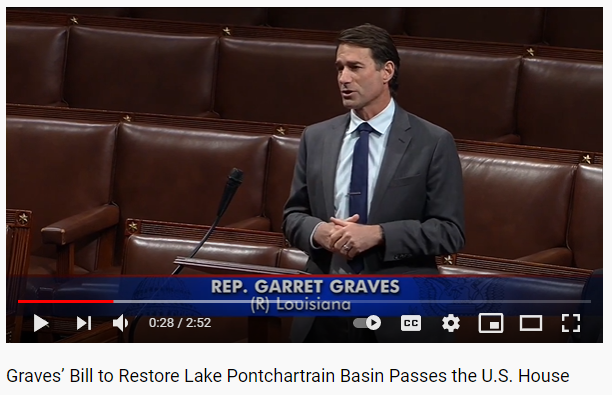Press Releases
Graves’ Bill to Restore Lake Pontchartrain Basin Passes the U.S. House
Washington, DC,
June 15, 2021
U.S. Congressman Garret Graves' bill to advance restoration of the Lake Pontchartrain Basin passed through the U.S. House today. H.R. 1921 provides federal support for the important work of improving the ecological health of Lake Pontchartrain and surrounding lakes and waterways to preserve critical habitat for shrimp, blue crab, trout, flounder, and other resources that the area provides for South Louisiana and the nation. "More than one-third of Louisianans live in the Lake Pontchartrain Basin – fishing its lakes, boating along its waterways, building businesses and growing their families with its resources. It is quintessential Louisiana and helps make our state one of the best places to live in and visit in America," said Graves. "Louisiana sits at the bottom of the funnel for the largest drainage system in North America and bears the brunt of flooding, water management and other challenges that the Mississippi River Watershed's 32 states and 2 Canadian provinces send our way, like diverting floodwaters into Lake Pontchartrain through the Bonnet Carre Spillway for a record-setting 5 times in 5 years. This bill helps ensure we can rise to that challenge and continue the work needed to protect, preserve, and promote the health of Lake Pontchartrain and the success of this nationally important region. I also want to say thank you Whip Steve Scalise, Congressman Troy Carter and former Congressman Cedric Richmond for their support and leadership on this bill as we look forward to it becoming law." "The Lake Pontchartrain Basin is one of our important environmental areas. Restoring, protecting, and ensuring it stays clean and healthy for the generations to come is one of the most important things anyone who cares about Southeast Louisiana can do. I am proud to have joined my colleague in getting this bill passed in the House. I look forward to working with everyone who wants to protect our natural treasures, like the basin's ecosystem, moving forward," Carter said. "Lake Pontchartrain provides vital flood protection to Louisiana and the 32 states in the Mississippi River Watershed," said CPRA Chairman Chip Kline. "We must protect the systems that protect us. We fully support reauthorizing the Lake Pontchartrain Basin Program, which would allow for the continued monitoring and management of one of our state's most important estuaries. I appreciate Congressmen Graves, Scalise and Carter for their continued efforts to restore and protect coastal Louisiana." "Pontchartrain Conservancy works each day to ensure an environmentally sustainable and prosperous region, but we cannot do it alone," said Pontchartrain Conservancy Executive Director Kristi Trail. "Lake Pontchartrain Basin's restoration begins with each of us. Our basin — which expands over 16 parishes — provides important ecological, cultural and economic benefits to the state. We're grateful for Reps. Graves' ongoing efforts to reauthorize this funding, which will enable our organization to continue maintaining a clean, healthy lake and basin for this and future generations, and to Reps. Steve Scalise and Troy Carter for their ongoing support." Click here or above to watch Graves' remarks on the U.S. House floor. Previously, the Pontchartrain Conservancy also submitted a letter of support which can be found here, and the Jefferson Parish Department of Ecosystem and Coastal Management submitted letters of support addressed to Chairman Peter DeFazio and Ranking Member Sam Graves. More about the legislation: The bill reauthorizes EPA's Lake Pontchartrain Basin Restoration Program for fiscal years 2022 through 2026 and clarifies that the LPB and watershed is not limited to the 5000 square miles, but in fact is well over 10,000 square miles in Louisiana and Mississippi. The bill also requires EPA to review the basin's restoration plan in order to examine program administration and look forward to future need and challenges. The Lake Pontchartrain Basin supports numerous species of fish, birds, mammals, and plants, and its fisheries contribute over $35 million to the local economy by providing much of the seafood harvested in the Gulf Coast. |




